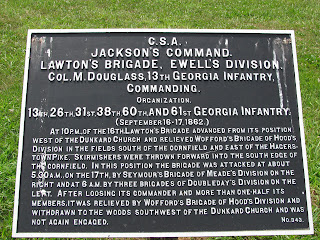The summer and winter of 1862 were hard times for the North. Confederate offensives from Maryland to the Mississippi River sat at the peak of Union setbacks in the summer of 1862. In the end, these offensives were turned back at Corinth, Perryville, and Antietam Creek; the latter also serving to redefine the nation and the war as it now sought to end slavery in the United States due to the Union victory on the banks of Antietam Creek. Abraham Lincoln stated that he issued the proclamation strictly “as a military measure” and as such, only slaves then in territories that “the people whereof shall then be in rebellion against the United States…” would “be then, thenceforward, and forever free….”
Tuesday, January 1, 2013
From Antietam Creek to Stones River: Two Victories that Saved the North and Reshaped the Nation
Tuesday, September 18, 2012
Thoughts on Sesquicentennial of the Battle of Antietam
I realize that I am a day late with this post but must say that after recovering from what proved to be a great weekend at Harpers Ferry and Antietam, I am truly glad to say that I was a part of it all! When I first became interested in the Civil War in the spring of 2002, never did I imagine that I would participate in the events commemorating the 150th Anniversary of the Battle of Antietam, a battle that changed the course of the war and changed the nation forever.
Briefly, I took part in the living history programs at Harpers Ferry all weekend, including a very touching moment at the site of the pontoon bridge over the Potomac River where 1,500 Union cavalrymen escaped Jackson's Confederates at Harpers Ferry 150 years to the minute as the escape was getting underway (more on that in an upcoming post). During the 150th Anniversary of the bloodiest single day in American history, I participated in the all day battlefield hike, which nearly 600 people attended (again, more on that in a later post). Great job and thank you to everyone at both parks for making the weekend one of the most memorable of my life.
Briefly, I took part in the living history programs at Harpers Ferry all weekend, including a very touching moment at the site of the pontoon bridge over the Potomac River where 1,500 Union cavalrymen escaped Jackson's Confederates at Harpers Ferry 150 years to the minute as the escape was getting underway (more on that in an upcoming post). During the 150th Anniversary of the bloodiest single day in American history, I participated in the all day battlefield hike, which nearly 600 people attended (again, more on that in a later post). Great job and thank you to everyone at both parks for making the weekend one of the most memorable of my life.
Tuesday, August 21, 2012
Alexander Lawton's Brigade (CS)
Alexander Lawton’s Brigade
Commanded by Col. Marcellus Douglass (13th Georgia Infantry)
Ewell’s Division, Jackson’s Command
13th Georgia Infantry
361 men commanded by Capt. D.A. Kidd
26th Georgia Infantry
188 men commanded by Col. Edmund N. Atkinson
31st Georgia Infantry
145 men commanded by Lieut. Col. John Terrell Crowder
38th Georgia Infantry
123 men commanded by Capt. William Henry Battey
60th Georgia Infantry
154 men commanded by Maj. Waters Burras Jones
61st Georgia Infantry
242 men commanded by Col. John Hill Lamar
 |
| Lawton's Brigade War Department Tablet located on the south side of Cornfield Ave. |
Subscribe to:
Posts (Atom)
